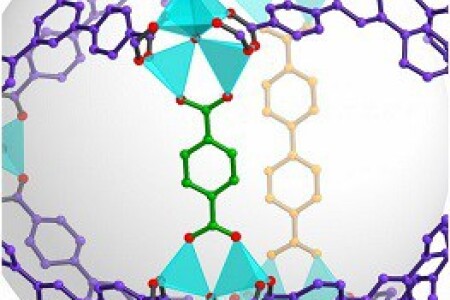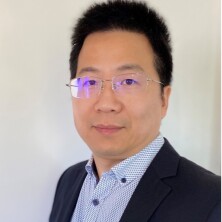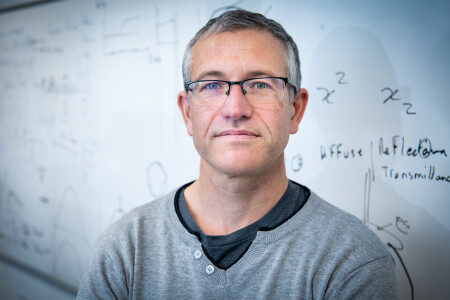Our research areas
Towards Zero Waste - Reconfigurable Systems
Building on our highly interdisciplinary track-record in soft materials, we will reimagine the use and reuse of materials themselves - for example working towards the kind of controlled reactions that occur in 'artificial cells' that self-regulate and reconfigure for synthetic biology and other functions
Towards Zero Carbon - Catalytic Architectures
Our research will support New Zealand's goal for 'net zero' carbon emissions by 2050. We will explore new materials that will catch CO2 from air and waste streams. We'll also design new catalysts that will turn CO2 into green fuels.
Read more about Towards Zero Carbon - Catalytic Architectures
Towards Low Energy Tech - Hardware for Future Computing
The data centres worldwide that support our digital lifestyles use almost ten times as much electricity per year as the whole of NZ. We are developing computing materials that process information more like a brain, and that use far less energy than conventional electronics.
Read more about Towards Low Energy Tech - Hardware for Future Computing
Sustainable Resource Use - Pūtaiao Māori Research Programme
Crosscutting these Research Programmes sits our Pūtaiao Māori Research Programme. This programme provides a platform for the other research programmes, intersecting with the theme of sustainability.
Read more about Sustainable Resource Use - Pūtaiao Māori Research Programme
Featured news & events

October 23, 2025
Two of our researchers take home 2025 KiwiNet Research Commercialisation awards
Two of our researchers took home KiwiNet awards last night — Dr Ben Mallett won the Ara Ake Breakthr…
Read more about Two of our researchers take home 2025 KiwiNet Research Commercialisation awards

October 9, 2025
The 2025 chemistry Nobel goes to MOFs
‘What a moment for those of us who love MOFs! It’s not every day that they grab the headlines, but…
MacDiarmid Institute
New Zealand's best scientists, engineers and educators, unified for a common goal: to make, understand, and use new materials to improve people's lives.February 20, 2019
Video transcript
The challenges facing New Zealand and the world today - clean water, renewable energy, climate change - will be solved by tomorrow's scientists and engineers - sitting in our classrooms right now, ready to be inspired. They need new materials and new technology based on those materials that haven't been discovered yet.
That's what the MacDiarmid Institute does. We are New Zealand's best scientists, engineers and educators, unified for a common goal: to make, understand, and use new materials to improve people's lives.
What is materials science
MacDiarmid Institute investigators discuss how materials science and nanotechnology can solve the big problems of our time.October 16, 2023
Video transcript
Professor Nicola Gaston: Can you imagine a future where electricity is practically free, where there's clean water available for everyone and a simple blood test taken at home can help diagnose some diseases?
The technology that can make each of those things possible is based on materials science. Materials are all around us; this coffee cup, this table, even this sugar I might put in the coffee. When we make things really small, as we do in nanotechnology, we create a material that has most of its substance at the surface. With sugar, that means it dissolves quickly. But in general what it means is that we can control the properties of that material with great precision. So we can take a material, any material - it could be a metal or it could be plastic - and we can play with the surface and give it new abilities. For example, we could make it anti-bacterial or we could make it absorb more light.
The MacDiarmid Institute is a network of New Zealand's best materials scientists. Materials science is the basis of all high-tech manufacturing, including sustainable environmental innovations such as new solar cells or carbon capture technologies for climate change mitigation. We work with existing industries and we also spinout new companies. In the past 15 years we have spun out 16 new companies.
Dr Ray Thomson: One of the really exciting things that the Investigators at MacDiarmid are working on is across this whole climate change area. Sequestering carbon dioxide, improving the efficiency of photovoltaic cells through to really advanced battery storage.
Professor Nicola Gaston: If we want that future, a materially sustainable future, where everyone around the world can have clean water, personalised medicine, free electricity, we need materials technologies. In the MacDiarmid Institute we bring materials scientists together and we partner with industry to create intellectual property, jobs and wealth for New Zealand.
Latest news & events

News Article
19 of our Investigators have been successful across 12 Marsden projects
November 6, 2025
About us
We are a Centre of Research Excellence, a network of committed biologists, chemists, physicists and engineers who collaborate to develop innovations that will both solve big problems and boost the New Zealand economy.
What we do
Our research is creating new technologies to aid the transition to a more sustainable way of life and make our world a better place.
Our partnerships
We have ongoing partnerships with community groups, museums and other organisations to help us take science out of the lab to make it accessible, exciting and inspiring.
Check out our latest research
Cornelio, J., Wagner, I., Otter, S., Chen, K., Hodgkiss, J.M. & Telfer, S.G. Unraveling Energy Transfer Dynamics and Exciton Diffusion in Multicomponent Metal–Organic Frameworks. ACS Applied Energy Materials 8, 3951–3962 (2025). https://doi.org/10.1021/acsaem.5c00501
Gito, D.A.D., Akbarinejad, A., Dixon, A., Loho, T., Nieuwoudt, M., Chen, Q., Domigan, L.J. & Malmström, J. Self-Assembled Piezoelectric Films from Aligned Lysozyme Protein Fibrils. Biomacromolecules 26, 514–527 (2025). https://doi.org/10.1021/acs.biomac.4c01305
Richardson, G.M., Rajeshkumar, T., Burke, F.M., Cameron, S.A., Nicholls, B.D., Harvey, J.E., Keyzers, R.A., Butler, T., Granville, S., Liu, L., Langley, J., Lim, L.F., Cox, N., Chilton, N.F., Hicks, J., Davis, N.J.L.K., Maron, L. & Anker, M. D. Four-electron reduction of benzene by a samarium(ii)-alkyl without the addition of external reducing agents. Nature Chemistry 17, 20–28 (2025). https://dx.doi.org/10.1038/s41557-024-01688-6
Studholme, S.J, Steel, J.K., Mallinson, J.B. & Brown, S.A. Probabilistic Computing with Percolating Nanoparticle Networks using Experimental Data with Signatures of Criticality. Neuromorphic Computing and Engineering 5, 014017 (2025). https://iopscience.iop.org/article/10.1088/2634-4386/adc0b8
Tayagui, A., Sun, Y., Nock, V. & Garrill, A. Fabrication of Lab-on-a-Chip Devices to Study the Forces Imparted by Growing Phytophthora Hyphae. Methods in molecular biology (Clifton, N.J.) 2892, 197–209 (2025). https://doi.org/10.1007/978-1-0716-4330-3_14
Zhang, Y., Yin, B.H., Huang, L., Ding, L., Lei, S., Telfer, S.G., Caro, J. & Wang, H. MOF membranes for gas separations. Progress in Materials Science 151, 101432 (2025). https://doi.org/10.1016/j.pmatsci.2025.101432
Zhao, W., Zhang, Y., Yin, Y., Xing, K., Zhou, S., Bake, A., Akhgar, G., Cortie, D., Chen, L., Wang, X., Rule, K. C., Medkehar, N. V., Granville, S. & Karel, J. Giant berry curvature in amorphous ferromagnet Co2MnGa. Matter 8, (2025). https://doi.org/10.1016/j.matt.2025.101988
Meet our people

Dr Shanghai Wei
Associate Investigator
Towards Zero Carbon - Catalytic Architectures
My first name, Shanghai, is pronounced the same as the city of Shanghai in China, but the Chinese character and meaning of Shang are different. In my name, Shang comes from my family tree and means "to value" and "to esteem," while Hai means "ocean" or "sea." Just like my name, I have a deep love for the sea and a lifelong dream of using my knowledge and research skills to protect the ocean, promoting green growth and sustainable development.

Dr Paul Hume
Associate Investigator
Towards Zero Carbon - Catalytic Architectures
Many of the world’s challenges can be seen as energy problems in one way or another, and combining different ways of thinking about energy materials is an exciting way to make progress.




